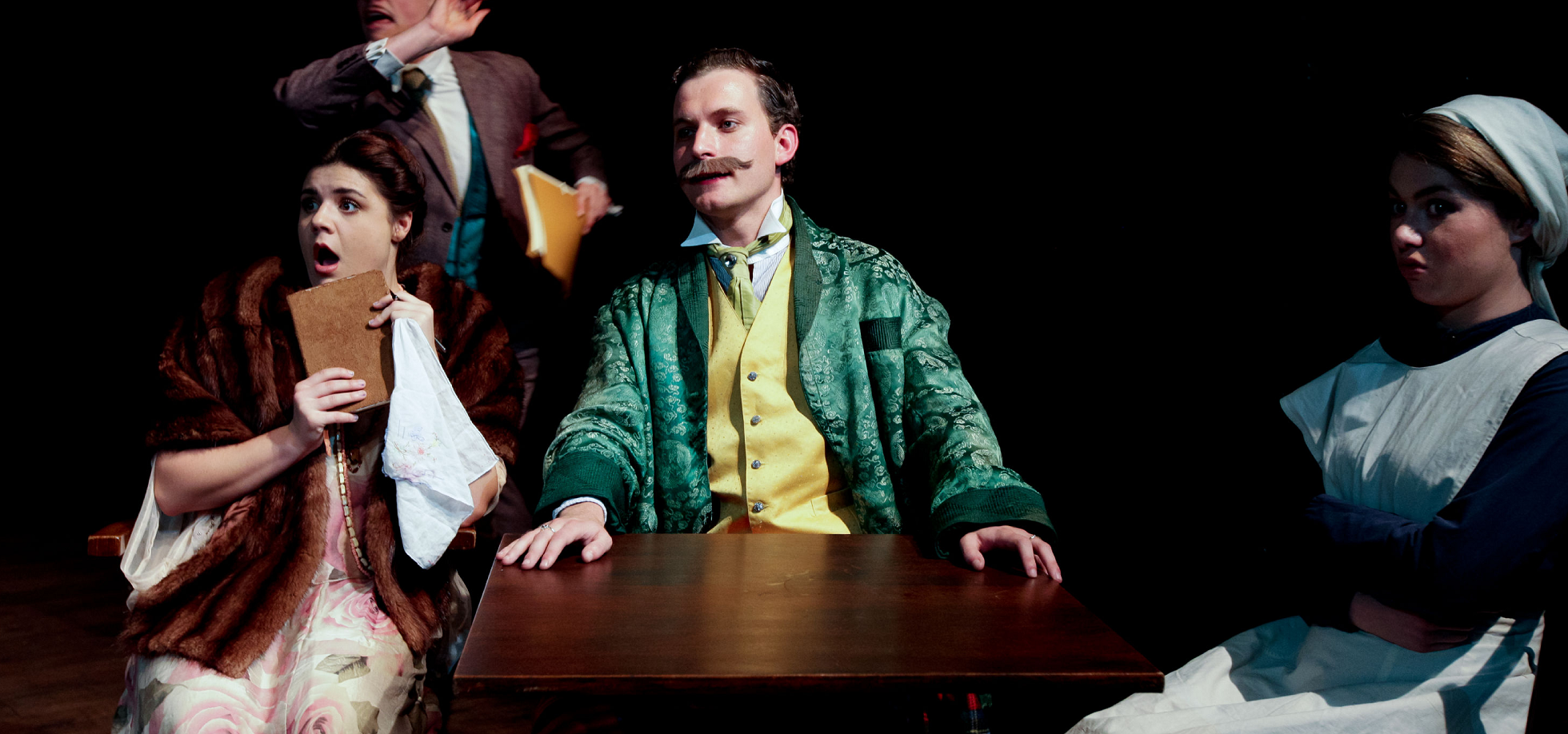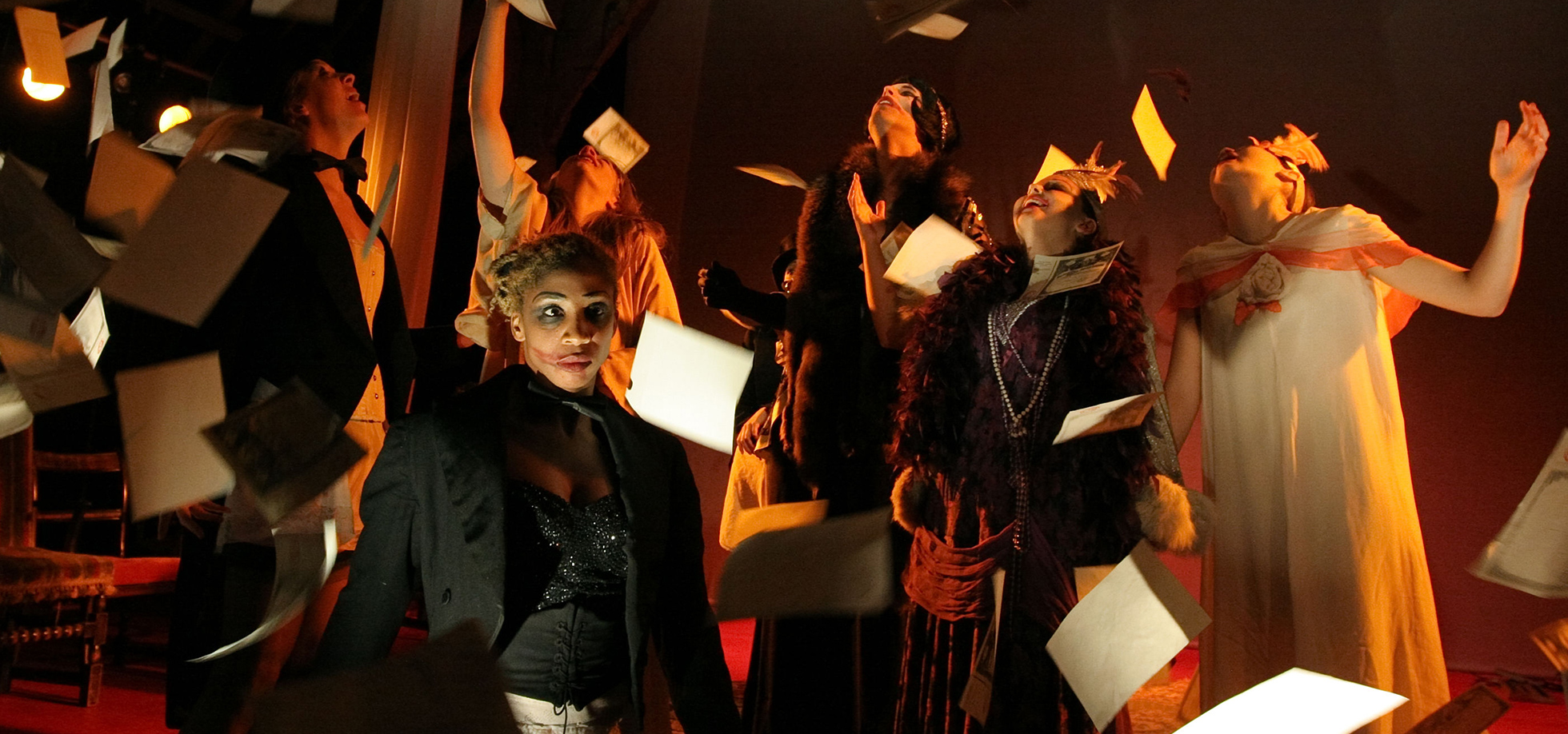This module is Part II of the two-part actor training in the second year. In it you will begin the application of advanced devising and improvising techniques to explore and experiment with a range of increasingly complex performance forms and styles. The work of this module challenges students' learning in early part of their BA Hons Contemporary Theatre course. You will learn to cope with unconventional performance spaces and the technical demands of productions in non-purpose built environments. You will explore and experiment with responses to the needs of audiences and learn to assess the creative opportunities and limitations of a range of potential performance venues.
You will work with a range of practitioners, both from within the School and with visiting directors, to encourage you to put your performance skills into practice under a variety of different styles of direction and, increasingly as the module progresses, in self-devised work. Students will begin to progress from the single performance showings of the early part of the degree programme to sustaining a run of performances in a variety of venues.
Students are assessed on their contribution and participation during the rehearsal process and performance of projects. As the module progresses assessment begins to focus less on processes and preparation and more on students' creative achievement in performance.
Commedia dell'Arte
You will begin the work of this module by undertaking short blocks of work in
Commedia dell'arte mask
Modern character mask
Parody
Object manipulation
Teachings of Grotowski and Lecoq
As part of this work you will expand your familiarity with non-naturalistic working methods and performer-led theatre. Students will further develop advanced acting and improvisation skills, including the ability to perform in 'larger than life' characterisations, advanced story-telling skills using a range of imaginative techniques and complex ensemble working. You will gain an understanding of the history of commedia dell'arte and its influence on contemporary theatre. This block of work will culminate in the creation of a fully coherent production from a pure improvisation starting point, performed at the end of the Spring Term to a School audience in the Corbett Theatre.
Forum Theatre Techniques
At the end of Terms One and Two students will undertake a one week intensive workshop to prepare for the Forum Theatre section of this module. They will decide on a topic - political or social - currently in the news, and learn how to research and address the issues to find the appropriate form in which to present this to an audience using satire, metaphor and reasoned argument. For two weeks at the start of Term Three students will work intensively on devising from current issues using Forum Theatre techniques, experimenting with ways of involving the audience in structured debate so that its members become 'spectators'.
You will explore the role of theatre as a tool for social change, developing your awareness of the world around you and of your place, as an artist, in your community. This block of work evolves from complementary work in EA225-2-FY Contextual Studies and is led by the Contextual Studies tutor. Consisting of four weeks' intensive work in total, the unit will culminate in an assessed Forum Theatre project in Week 2 of Term Three which will be studio-based for two performances and will also be given a showing in an external theatre venue, the Redbridge Theatre.
Multi-Media - Theatre Meets Film
In this part of the module students are introduced to the technical and artistic demands of multi-media performance methods. Working with outside multi-media specialists, students will investigate film styles and structures and their cross-fertilisation with theatre. You will learn the uses of film equipment in live performance and experiment with multi-media to test the strengths and weaknesses of its application to the creation of atmosphere and the development of metaphor and story-telling. Students will devise a studio-based presentation using multi-media techniques and equipment which they will perform to an invited audience of staff and students in the Chigwell School Theatre in Week 7 of the Summer Term.
Site-Specific Classic Theatre
The final block of work will bring the whole year group together to create a piece of theatre on a large-scale in a non-theatre venue. Students will work with a professional Visiting Director to stage and present a classic text (for example Shakespeare, Greek tragedy) to a public audience. Sites chosen for the presentation could, for example, be historic buildings, warehouses or naturally-occurring landscape features such as caves. You will be presented with the challenges of
working on a larger scale
a public venue that is not a purpose-built performance space
site-specific interpretation working from a classical text.
Technical Studies
As an integral part of this module students will explore the relationship between the essence and style of a piece of theatre and the practicalities of realising this in performance, related to their practical projects through the year. Working with tutors from the Technical Department, students will explore their own design projects, working within resource limitations, both financial and physical, and assessing and applying health and safety guidelines. Assessment of Technical Studies is continuous through observation of class work and its realisation in projects.
Moodle
Search results: 3
Category: Loughton

This is a compulsory second year course for students on the BA Hons Contemporary Theatre degree scheme. In the second year the rigorous foundation work of first year is developed and the individual range of vocal choices is explored in association with the work EA221 and EA222 Expressionism I and II. You will work on developing vocal skills for devised and improvised work, for the vocal expression of original creative writings such as poetry and for performance in a range of contemporary theatre styles and forms. By the end of this three-term module you will have the vocal flexibility (breath, pace, resonance, pitch and articulation) to meet the specific demands of self-created projects.
Term One
Exploring accents and dialects
Breath support and physical energy
Developing pitch and resonance range
Understanding poetic styles and devices
17th century commedia dell'arte rhetorical devices
Term Two
Exploring rhythmic text through voice and language
Style, form and use of language in poetry
Adapting breath and articulation to the demands of poetry
Pitch and resonant range for poetry and emotion
Use of Received Pronunciation in sustained and emotionally demanding contexts
Term Three
Warm-ups for specific character styles
Developing sensitivity, power and passion in the voice
Muscular and resonant articulation for emotional flexibility
Techniques to carry intimate speech into performance space.
Term One
Exploring accents and dialects
Breath support and physical energy
Developing pitch and resonance range
Understanding poetic styles and devices
17th century commedia dell'arte rhetorical devices
Term Two
Exploring rhythmic text through voice and language
Style, form and use of language in poetry
Adapting breath and articulation to the demands of poetry
Pitch and resonant range for poetry and emotion
Use of Received Pronunciation in sustained and emotionally demanding contexts
Term Three
Warm-ups for specific character styles
Developing sensitivity, power and passion in the voice
Muscular and resonant articulation for emotional flexibility
Techniques to carry intimate speech into performance space.
- Module Supervisor: Christina Gutekunst
Category: Loughton

This is a compulsory second year course for BA Hons Contemporary Theatre students. The work of the module supports the content and practical project work of EA221 and EA222 Expressionism I and II. You will begin the work of this module by learning to make the connections between the different era of the evolution of Commedia as a theatrical form. You will prepare for a site-specific interpretation of a classic text later in the year by acquiring a general understanding of the history, politics and cultural life of the Elizabethan era. From this you will progress to analysis of Shakespeare text in both historical and contemporary contexts. In the second term you will examine the work of influential acting theorists and practitioners of progressively increasing complexity so that by the final term you are equipped to undertake a comparative analysis of a range of styles and forms of contemporary 'political' theatre.
A unique and important aspect of this module is the creative writing content. Throughout the year you will work with a creative writing tutor to develop your ability to write self-created work for performance. By the end of the module you will be prepared to progress to the final year of the degree scheme in which the strongest emphasis is placed on students' own work.
Term One
Origins of commedia as a theatrical form
Social and cultural contexts of commedia
Modern commedia dell'arte applications, eg Copeau, Lecoq
Shakespeare and the Elizabethan era
Term Two
Naturalism and Realism: Chekhov, Stanislavski and Strasberg
Contemporary acting theory: Grotowski, Meyerhold and Biomechanics
Term Three
An examination of the term 'political' in a theatrical context
Playwrights and practititioners associated with political theatre: Dario Fo, Bertolt Brecht, Augusto Boal, John McGrath
The emergence of the American avant garde in the 1960s
Post-modernism in the work of Robert Wilson and Pina Bausch.
A unique and important aspect of this module is the creative writing content. Throughout the year you will work with a creative writing tutor to develop your ability to write self-created work for performance. By the end of the module you will be prepared to progress to the final year of the degree scheme in which the strongest emphasis is placed on students' own work.
Term One
Origins of commedia as a theatrical form
Social and cultural contexts of commedia
Modern commedia dell'arte applications, eg Copeau, Lecoq
Shakespeare and the Elizabethan era
Term Two
Naturalism and Realism: Chekhov, Stanislavski and Strasberg
Contemporary acting theory: Grotowski, Meyerhold and Biomechanics
Term Three
An examination of the term 'political' in a theatrical context
Playwrights and practititioners associated with political theatre: Dario Fo, Bertolt Brecht, Augusto Boal, John McGrath
The emergence of the American avant garde in the 1960s
Post-modernism in the work of Robert Wilson and Pina Bausch.
- Module Supervisor: Zois Pigadas
Category: Loughton